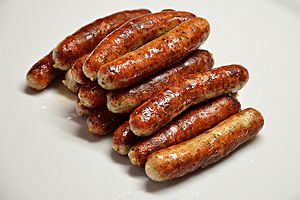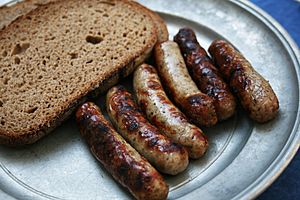Nürnberger Rostbratwurst facts for kids
 |
The Nürnberger Rostbratwurst is a super famous German sausage. Its name means "Nuremberg grilled sausage." This special sausage comes from the city of Nuremberg in Germany. It's a small, tasty sausage that people love to grill and eat!
Contents
A Taste of History
This sausage has a really long history! Its recipe is super old, going all the way back to the 1300s. That's over 700 years ago!
Even famous people loved these sausages. The poet Johann Wolfgang von Goethe enjoyed them so much that he had them sent to him by mail in another city called Weimar. Imagine getting sausages in the mail!
What Makes It Special?
Nürnberger Rostbratwurst sausages are quite small and thin. They are usually about 7 to 9 centimeters long and weigh around 20 grams. They have a light color.
These sausages are made from pork meat, along with some bacon. They get their special flavor from a spice called marjoram. Other spices like pepper, chervil, cardamom, ginger, and lemon are also used. Each sausage maker has their own secret mix of spices! The outside casing of the sausage is made from sheep.
Only from Nuremberg!
The Nürnberger Rostbratwurst is very special because it has a "protected geographical indication" (PGI) status. This protection is recognized all over the European Union.
What does this mean? It means that a Nürnberger Rostbratwurst can only be made in the city of Nuremberg. If it's made anywhere else, it can't be called a true Nürnberger Rostbratwurst!
How to Enjoy Nürnberger Rostbratwurst
The best way to eat these sausages is when they are grilled until they are nicely browned. People often eat them three at a time, placed inside two slices of bread. They usually add mustard and sauerkraut (which is fermented cabbage).
You can find these tasty snacks at many small shops or kiosks in Nuremberg. If you're having them as a main meal, they are often served with sauerkraut, potato salad, or horseradish.
Other Sausages and Dishes
See also
 In Spanish: Nürnberger Rostbratwurst para niños
In Spanish: Nürnberger Rostbratwurst para niños
 | Laphonza Butler |
 | Daisy Bates |
 | Elizabeth Piper Ensley |


